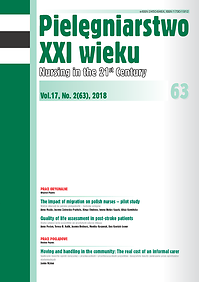Supplementation of vitamins and minerals during lactation
DOI:
https://doi.org/10.2478/pielxxiw-2018-0014Keywords:
lactation, vitamins, micronutrients, macronutrientsAbstract
SUPPLEMENTATION OF VITAMINS AND MINERALS DURING LACTATION
Introduction. During the lactation period, energy demand and nutritional needs increase in woman. The basis of proper nutrition should consist of a balanced diet and concomitant vitamins and minerals supplementation in doses recommended by major scientific societies. Lactation has a priority over metabolic processes in mother. It absorbs 400-670 kcal per day and increases in case of multiples.
Breastfeeding is the best method of feeding infants during their first 6 months of life, therefore it should be promoted among mothers and supported by qualified specialists. According to The World Health Organization (WHO) and The European Society for Paediatric Gastroenterology Hepatology and Nutrition [ESPGHAN], the percentage of women continuing breastfeeding at the child’s age of six months is low and in Poland it is 4-9% for exclusive breastfeeding and 63% for partial breastfeeding. In Europe, only in four countries the percentage of women continuing exclusive breastfeeding at infant’s 6 months of age exceeds 30% (Hungary, Malta, Portugal, Slovakia).
Aim. The following article is a collection of current recommendations on vitamins and minerals supplementation during lactation. In addition to the recommendations, practical aspects of successful lactation and its impact on the health of infants and mothers have been described.
References
1. Kowalska D, Gruczyńska E, Bryś J. Mleko matki - pierwsza żywność w życiu człowieka. Probl Hig Epidemiol. 2015; 96(2): 387-398.
2. Lis J, Orczyk-Pawiłowicz M, Kątnik-Prastowska I. Białka mleka ludzkiego zaangażowane w procesy immunologiczne. Postepy Hig Med Dosw. (Online) 2013 May 31; 67: 529-47.10.5604/17322693.105164823752605
3. Barbarska O, Zielińska M, Pawlus B, Wesołowska A. Characteristics of the regional human milk bank in Poland - donors, recipients and nutritional value of human milk. Rocz Panstw Zakl Hig. 2017; 68(4): 395-400.
4. Szajewska H, Horvath A, Rybak A, Socha P. Karmienie piersią. Stanowisko Polskiego Towarzystwa Gastroenterologii, Hepatologii i Żywienia Dzieci. Standardy Medyczne/Pediatria. 2016; 13: 9-24.
5. World Health Organization, United Nations Children’s Fund: Protecting, Promoting and Supporting Breast-feeding: The special role of Maternity Services. Geneva, Switzerland, World Health Organization. 1989; 13-18.
6. Guideline: Protecting, Promoting and Supporting Breastfeeding in Facilities Providing Maternity and Newborn Services. Geneva: World Health Organization; 2017.
7. Michaelsen KF, Weaver L, Branca F et al. Feeding and nutrition of infants and young children. Guidelines for the WHO European Region. WHO regional publications. European series; No 87.
8. ESPGHAN Committee on Nutrition. Breast-feeding: A commentary by the ESPGHAN Committee on Nutrition. J Pediatr Gastroenterol Nutr 2009; 49: 112- 125.10.1097/MPG.0b013e31819f1e0519502997
9. American Academy of Pediatrics. Section on Breastfeeding. Breastfeeding and the use of human milk. Pediatrics 2005; 115: 496-506.10.1542/peds.2004-249115687461
10. Rekomendacje Polskiego Towarzystwa Ginekologicznego w zakresie stosowania witamin i mikroelementów u kobiet planujących ciążę, ciężarnych i karmiących. Ginekol Pol. 2014; 85: 395-399.
11. Nehring-Gugulska M, Żukowska-Rubik M, Pietkiewicz A (red.). Karmienie piersią w teorii i praktyce. Podręcznik dla doradców i konsultantów laktacyjnych oraz położnych, pielęgniarek i lekarzy. Krakow: Medycyna Praktyczna, 2012.
12. Bułhak-Jachymczyk B. Witaminy. [w:] Jarosz M, Bułhak-Jachymczyk B, red. Normy żywienia człowieka. Podstawy prewencji otyłości i chorób niezakaźnych. Warszawa: IŻŻ , PZWL; 2008, s.172-232.
13. Borszewska- Kornacka MK i wsp. Stanowisko Grupy Ekspertow w sprawie zaleceń żywieniowych dla kobiet w okresie laktacji. Standardy Medyczne/Pediatria. 2013;10: 265-279.
14. Makowska-Donajska M, Hirlne L. Suplementacja witamin i składników mineralnych podczas ciąż y. Gin. Perinat. Prakt. 2017; 2, 4: 93-99.
15. Płudowski P, Karczmarewicz E, Bayer M et al. Practical guidelines for the supplementation of vitamin D and the treatment of deficits in Central Europe - recommended vitamin D intakes in the general population and groups at risk of vitamin D deficiency. Endokrynol Pol. 2013; 64: 319-327.10.5603/EP.2013.0012
16. Buczkowski K. i wsp. Wytyczne dla lekarzy rodzinnych dotyczące suplementacji witaminy D. Forum Medycyny Rodzinnej. 2013; 7, 2: 55-58.
17. Jarosz M. i wsp. Normy żywienia dla populacji polskiej - nowelizacja. Warszawa: Instytut Żywności i Żywienia; 2012.
Published
Issue
Section
License
Copyright (c) 2018 Authors

This work is licensed under a Creative Commons Attribution-NonCommercial-NoDerivatives 3.0 Unported License.




